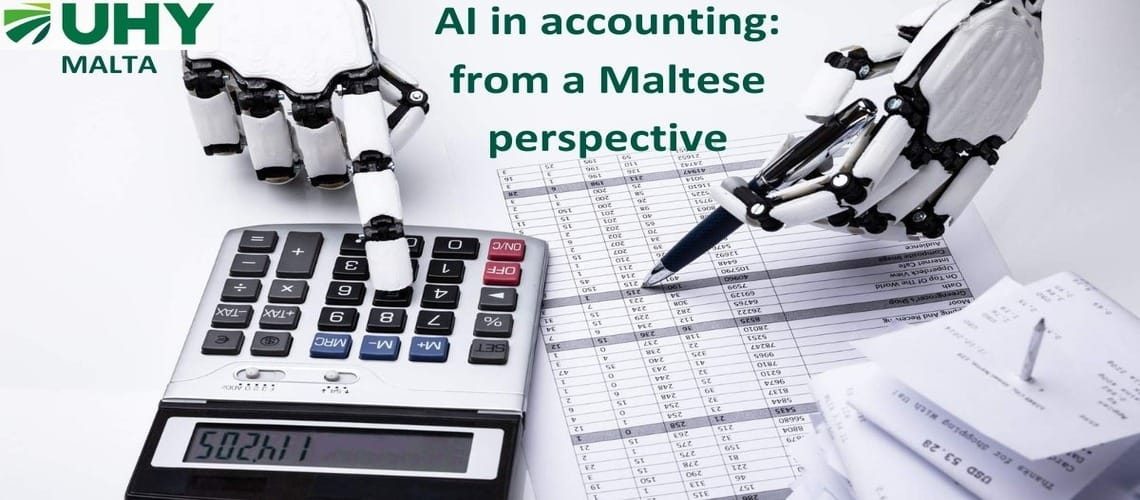The Future of Accounting in Malta: Embracing Artificial Intelligence
Artificial Intelligence (AI) is rapidly transforming industries across the globe, and the
accounting sector in Malta is no exception. As businesses on the island continue to adapt to
the digital age, the integration of AI into accounting is becoming more prominent, reshaping
how professionals manage financial data, streamline operations, and maintain compliance.
What is AI in Accounting?
AI refers to the use of advanced algorithms and machine learning systems that can process
vast amounts of data and perform tasks that traditionally required human intelligence. In
accounting, this includes automating processes such as bookkeeping, audits, tax
preparation, and financial analysis. AI can help accountants work more efficiently, reduce
human error, and focus on higher-level tasks like strategic decision-making.
How AI is Transforming the Maltese Accounting Landscape
In Malta, accounting firms are increasingly adopting AI to stay competitive and meet the
demands of the evolving financial landscape. Here are some key ways AI is impacting
accounting practices in Malta:
- Automation of Routine Tasks
Traditionally, accountants spend a lot of time performing manual data entry,
reconciling transactions, and preparing financial statements. AI-powered software
can automate these routine tasks, freeing up professionals to focus on value-added
services. For example, AI-driven bookkeeping platforms can categorize expenses,
generate invoices, and even predict cash flow trends without constant human input. - Improved Accuracy and Compliance
Maltese businesses must adhere to complex tax regulations and financial reporting
standards, such as those set by the Malta Financial Services Authority (MFSA) and
international bodies like the EU. AI can help by minimizing errors in data entry and
financial reports, ensuring that accountants are compliant with the latest regulations.
AI-powered audit tools can also detect anomalies in financial transactions, reducing
the risk of fraud or misreporting. - Real-time Financial Insights
AI tools provide accountants with real-time access to financial data, making it easier
to track company performance, manage budgets, and forecast future growth. In
Malta, where small and medium enterprises (SMEs) form the backbone of the
economy, these insights are crucial for business owners to make informed decisions
quickly. AI systems can analyze financial data and provide personalized
recommendations for optimizing tax strategies, cutting costs, or investing in new
ventures. - Enhanced Client Relationships
With AI taking care of the more mundane aspects of accounting, Maltese
accountants can dedicate more time to building stronger relationships with their
clients. By using AI to quickly gather and interpret financial data, accountants can
offer tailored advice and solutions that align with their clients’ long-term goals. This
ability to provide deeper insights and personalized services is becoming a
competitive advantage in Malta’s accounting market.
The Challenges and Opportunities Ahead
While AI offers many benefits, there are also challenges associated with its implementation
in the Maltese accounting industry. One major concern is the potential loss of jobs as
automation becomes more widespread. However, rather than replacing accountants, AI is
more likely to change the nature of their work. Maltese accountants will need to upskill,
focusing on analytical thinking, strategic planning, and consulting, as AI handles repetitive
tasks.
Another challenge is the initial cost of implementing AI solutions. Smaller firms may struggle
to invest in these technologies, but as AI becomes more affordable and user-friendly, it is
expected that more businesses will integrate it into their operations.
For Maltese accountants willing to embrace these changes, AI presents an opportunity to
evolve their services and provide even greater value to their clients. From offering deeper
insights into financial health to helping businesses navigate the complexities of local and
international regulations, AI has the potential to make accounting more efficient, accurate,
and client-focused.
Looking Forward
The future of accounting in Malta is set to be shaped by technological advancements, with AI
playing a pivotal role. As AI adoption grows, Maltese firms that leverage these tools will be
better positioned to succeed in a competitive global market, attract new clients, and stay
ahead of the curve. Accountants who are proactive in embracing AI will not only future-proof
their careers but will also drive innovation within their firms and help businesses across
Malta thrive.
Conclusion
Artificial intelligence is no longer a distant concept but a reality reshaping Malta’s accounting
industry. Whether you’re a business owner or a professional accountant, staying informed
and adaptable to AI-driven changes will be crucial in navigating the future of finance. The
key is to see AI not as a threat, but as a tool that empowers accountants to offer smarter,
faster, and more tailored services in Malta’s ever-evolving business environment.

